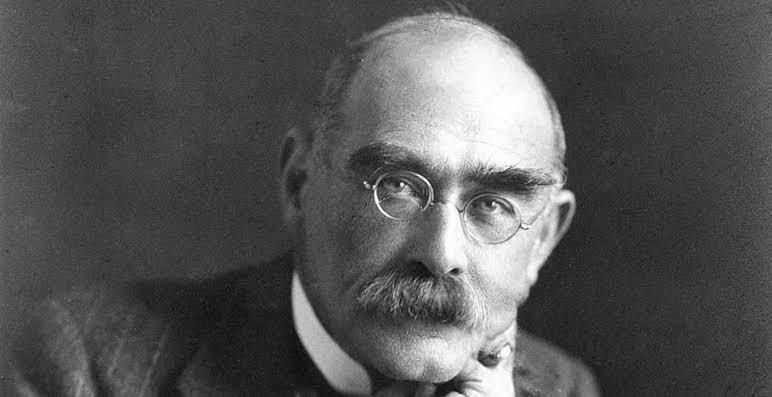
Joseph Rudyard Kipling was born on the 6th day of Christmas, December 30, 1865, in Mumbai, India, and lived just a few weeks past his 70th birthday. He passed away in London on the 18th of January, 1936.
I first knew his name in my early childhood when I watched the 78 minute animated film, The Jungle Book, which was released by Disney on Chuck Swindoll's 33rd birthday, October 18, 1967, just 3 days before my brother Chris was born, and a little over 5 years before my arrival on February 1st, 1973.
I loved The Jungle Book! I am still a fan of the 1967 film.
When I was 17, I was a student at The Summit in Manitou Springs, Colorado, and it was in those early days of May, 1990, that I was to learn Rudyard Kipling had a very rich life, and was known for much more than The Jungle Book. Rudyard Kipling was born in a time when men had minds, and culture, which has always arguably had a measure of foolishness, seemed over all much more thoughtful than today. I am alarmed by the mindless drivel that makes up much of what surrounds us these days. Which just makes mindful men and women, of a time before us, or now, all the more valuable. Kipling had a great mind, and I am grateful for the gifts he gave to all of us.
One of my favorite speakers at the Summit recited Kipling's "The Gods of the Copybook Headings" and I was captivated! It wasn't long before I had put each line to my own memory, and later, his wife (they are dear friends of mine to this day!) introduced me to what instantly became (and has remained) my favorite Kipling poem, IF. Another friend I met through The Summit, but the next year, when I returned as staff, shared The Truce of The Bear with me, and I memorized and performed that poem with a friend of mine. It was great fun! I don't know why I never memorized IF, my favorite, and by far, the simplest of the 3 to learn. I now only remember parts of The Gods of The Copybook Headings and The Truce of The Bear.
I will share these 3 works of Kipling with you, in the order I have (or not) memorized them: The Gods of The Copybook Headings, The Truce of The Bear, and IF.
THE GODS OF THE COPYBOOK HEADINGS by Rudyard Kipling
As I pass through my incarnations in every age and race, I make my proper prostrations to the Gods of the Market Place. Peering through reverent fingers I watch them flourish and fall, And the Gods of the Copybook Headings, I notice, outlast them all. We were living in trees when they met us. They showed us each in turn That Water would certainly wet us, as Fire would certainly burn: But we found them lacking in Uplift, Vision and Breadth of Mind, So we left them to teach the Gorillas while we followed the March of Mankind. We moved as the Spirit listed. They never altered their pace, Being neither cloud nor wind-borne like the Gods of the Market Place, But they always caught up with our progress, and presently word would come That a tribe had been wiped off its icefield, or the lights had gone out in Rome. With the Hopes that our World is built on they were utterly out of touch, They denied that the Moon was Stilton; they denied she was even Dutch; They denied that Wishes were Horses; they denied that a Pig had Wings; So we worshipped the Gods of the Market Who promised these beautiful things. When the Cambrian measures were forming, They promised perpetual peace. They swore, if we gave them our weapons, that the wars of the tribes would cease. But when we disarmed They sold us and delivered us bound to our foe, And the Gods of the Copybook Headings said: "Stick to the Devil you know." On the first Feminian Sandstones we were promised the Fuller Life (Which started by loving our neighbour and ended by loving his wife) Till our women had no more children and the men lost reason and faith, And the Gods of the Copybook Headings said: "The Wages of Sin is Death." In the Carboniferous Epoch we were promised abundance for all, By robbing selected Peter to pay for collective Paul; But, though we had plenty of money, there was nothing our money could buy, And the Gods of the Copybook Headings said: "If you don't work you die." Then the Gods of the Market tumbled, and their smooth-tongued wizards withdrew And the hearts of the meanest were humbled and began to believe it was true That All is not Gold that Glitters, and Two and Two make Four And the Gods of the Copybook Headings limped up to explain it once more. As it will be in the future, it was at the birth of Man There are only four things certain since Social Progress began. That the Dog returns to his Vomit and the Sow returns to her Mire, And the burnt Fool's bandaged finger goes wabbling back to the Fire; And that after this is accomplished, and the brave new world begins When all men are paid for existing and no man must pay for his sins, As surely as Water will wet us, as surely as Fire will burn, The Gods of the Copybook Headings with terror and slaughter return!
THE TRUCE OF THE BEAR by Rudyard Kipling
Yearly, with tent and rifle, our careless white men go By the Pass called Muttianee, to shoot in the vale below. Yearly by Muttianee he follows our white men in— Matun, the old blind beggar, bandaged from brow to chin. Eyeless, noseless, and lipless - toothless, broken of speech, Seeking a dole at the doorway he mumbles his tale to each; Over and over the story, ending as he began: "Make ye no truce with Adam-zad - the Bear that walks like a Man! "There was a flint in my musket - pricked and primed was the pan, When I went hunting Adam-zad - the Bear that stands like a Man. I looked my last on the timber, I looked my last on the snow, When I went hunting Adam-zad fifty summers ago! "I knew his times and his seasons, as he knew mine, that fed By night in the ripened maizefield and robbed my house of bread. I knew his strength and cunning, as he knew mine, that crept At dawn to the crowded goat-pens and plundered while I slept. "Up from his stony playground - down from his well-digged lair— Out on the naked ridges ran Adam-zad the Bear— Groaning, grunting, and roaring, heavy with stolen meals, Two long marches to northward, and I was at his heels! "Two long marches to northward, at the fall of the second night, I came on mine enemy Adam-zad all panting from his flight. There was a charge in the musket - pricked and primed was the pan— My finger crooked on the trigger - when he reared up like a man. "Horrible, hairy, human, with paws like hands in prayer, Making his supplication rose Adam-zad the Bear! I looked at the swaying shoulders, at the paunch's swag and swing, And my heart was touched with pity for the monstrous, pleading thing. "Touched with pity and wonder, I did not fire then . . . I have looked no more on women - I have walked no more with men. Nearer he tottered and nearer, with paws like hands that pray— From brow to jaw that steel-shod paw, it ripped my face away! "Sudden, silent, and savage, searing as flame the blow - Faceless I fell before his feet, fifty summers ago. I heard him grunt and chuckle - I heard him pass to his den. He left me blind to the darkened years and the little mercy of men. "Now ye go down in the morning with guns of the newer style, That load (I have felt) in the middle and range (I have heard) a mile? Luck to the white man's rifle, that shoots so fast and true, But - pay, and I lift my bandage and show what the Bear can do!" (Flesh like slag in the furnace, knobbed and withered and grey— Matun, the old blind beggar, he gives good worth for his pay.) "Rouse him at noon in the bushes, follow and press him hard - Not for his ragings and roarings flinch ye from Adam-zad. "But (pay, and I put back the bandage) this is the time to fear, When he stands up like a tired man, tottering near and near; When he stands up as pleading, in wavering, man-brute guise, When he veils the hate and cunning of his little, swinish eyes; "When he shows as seeking quarter, with paws like hands in prayer That is the time of peril - the time of the TRuce of the Bear!" Eyeless, noseless, and lipless, asking a dole at the door, Matun, the old blind beggar, he tells it o'er and o'er; Fumbling and feeling the rifles, warming his hands at the flame, Hearing our careless white men talk of the morrow's game; Over and over the story, ending as he began:— "There is no truce with Adam-zad, the Bear that looks like a Man!"
IF by Rudyard Kipling
IF you can keep your head when all about you Are losing theirs and blaming it on you, If you can trust yourself when all men doubt you, But make allowance for their doubting too; If you can wait and not be tired by waiting, Or being lied about, don't deal in lies, Or being hated, don't give way to hating, And yet don't look too good, nor talk too wise: If you can dream - and not make dreams your master; If you can think - and not make thoughts your aim; If you can meet with Triumph and Disaster And treat those two impostors just the same; If you can bear to hear the truth you've spoken Twisted by knaves to make a trap for fools, Or watch the things you gave your life to, broken, And stoop and build 'em up with worn-out tools: If you can make one heap of all your winnings And risk it on one turn of pitch-and-toss, And lose, and start again at your beginnings And never breathe a word about your loss; If you can force your heart and nerve and sinew To serve your turn long after they are gone, And so hold on when there is nothing in you Except the Will which says to them: 'Hold on!' If you can talk with crowds and keep your virtue, ' Or walk with Kings - nor lose the common touch, if neither foes nor loving friends can hurt you, If all men count with you, but none too much; If you can fill the unforgiving minute With sixty seconds' worth of distance run, Yours is the Earth and everything that's in it, And - which is more - you'll be a Man, my son!





